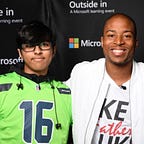Imagine you are one of the best employees at your company. Your work over the last few years has been on par with the best, and your company wants to give you a raise for your efforts.
There’s just one tiny catch.
Or two… Or a three.
You’ll be paid like the best, but not the best. More like the fifth-best. You also have no chance to communicate with other companies who want to give you a long-term job. Now that your current employer has given you this raise, you’re locked into the deal. And worst of all, your contract will expire in just one year. If you can’t produce on the same level in the coming year, there’s no telling whether you’ll ever find a long-term job at this pay grade.
Let’s recap: You get paid among the best for just a single year, but your right to find a better-paying job that you are qualified for is revoked and your job security is on the ropes. It may seem like a fun problem to have, but once the days turn into months and pressure kicks in to perform, you’d wish you had some job security.
Yikes.
That exact situation applied to nine NFL players yesterday, all of whom were franchise-tagged. A tradition that started in 1993, the franchise tag is applied to players who are set to become free agents.
But how does it work? In short, players who are franchise-tagged get a one-year contract extension with their current teams that pays them at the fifth-highest salary for their position. They cannot negotiate the deal and have little other option than to simply sign it and play another season. For example, since WR Chris Godwin was franchise-tagged yesterday, he will earn $15–16 million for one season of play since that would make him the fifth highest-paid receiver in the NFL. It’s essentially a band-aid for teams that cannot afford to hand players long-term deals. This leads to teams like the Super Bowl Champion Buccaneers having another tool at their disposal for keeping their player base together.
With that in mind, you may be wondering why the franchise tag is so bad it “needs to go.” In short, it provides teams an ultimate weapon to use on their free agents while taking any chance of a long-term deal away from the player.
Like I said in my long-winded analogy, players who are franchise-tagged don’t get paid at the top of their position group. Instead, they settle for an appealing 5th spot, but in total it could be far less than what they would’ve got on the open market.
Let’s bring in the example of newly tagged receiver Chris Godwin once again. At 25-years-old, Godwin is just hitting his prime. With over 3,500 receiving yards in his first four seasons, he has proven that he can hang with some of the best receivers in the NFL. As such, Spotrac approximates his market value at $17 million/year on a four-year deal, $2 million more per year than what he is getting on his single-year franchise tag. This means Godwin missed out on a potential $68 million deal for a $15 million tag.
He gets just one season of job security that pays less than a single season of his market value contract would. You also have to consider that job security isn’t just dependent on how a guy like Godwin, or Jets safety Marcus Maye plays in 2021 though. I don’t have to remind anyone that American Football is one of the most dangerous sports around. Any snap could be a player’s last, and they recognize that. How many times have we seen a wide receiver or pass rusher elevate their game in the final year of their rookie contract?
They know that if they don’t play well and get injured, their chances at a contract wrought with generational wealth could slip out of their grasp. So it’s unacceptable that teams can force them back into that desperate state by tagging them, even if they played a season worth a long deal.
I will concede that some franchise-tagged players deserve it. When the Giants tagged edge rusher Jason Pierre-Paul after he had just suffered a serious hand injury in the previous offseason, I understood their reluctance to give him a long extension. One could say that it was a little bit much for a guy in his position.
But Pierre-Paul’s situation wasn’t like that of most guys who get tagged. He was a special case where teams weren’t thrilled to give him a long-term deal, and he still needed to prove himself. In lieu of the typical one-year minimum “prove-it” deal that some players get, the Giants gave Pierre-Paul a whole lot more with the tag.
The fact remains: Every year, players that could get long-term extensions on the market are routinely taken out of free agency because they were franchise-tagged.
Another interesting fold to the franchise tag is how it can completely dilute the market for a certain position in any given offseason. The two best receivers in free agency were just tagged — Allen Robinson and Chris Godwin. Those guys could’ve been number one options for the many teams that would’ve compensated them upwards of $65 million, but those teams will have to look elsewhere. All because the teams that practically own these players decided to renew their lease for about $50 million cheaper.
The franchise tag is quite literally the embodiment of the NFL’s apathetic nature towards its players while also managing to dilute the free-agent market. In an age where Deshaun Watson is actively forcing his way out of a franchise he just signed with and in a league where it has become routine to see players exercise their newfound leverage by holding out, the franchise tag remains.
It is impeding progress in player empowerment.
It is taking top free agents off the market.
It is withholding generational wealth.
It simply needs to go.
